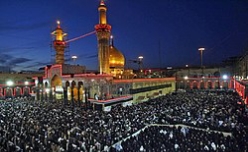
Shia Islam is a major branch, which accounts for a significant portion of the total population of Islam. The core aqeedah (belief) of Shiism has evolved from the beginning of Islamic history to the present day. Their beliefs, traditions and religious practices are largely based on the concept of specific imamate system. The main tenets of the Shia faith are:
1. Tawheed (Oneness of God)
Tawheed is the core belief of Shia Islam, which believes in the oneness and indivisibility of God. They believe that Allah is One, Unique, and has no partners. This belief is a fundamental pillar of Islam and central to both Shia and Sunni sects.
2. Nubuwat (Prophets)
Belief in Prophets is very important in Shia religion. Shias believe that Allah sent messengers to guide mankind to the right path. Muhammad (pbuh) is the last prophet, and no other prophet will come after him. However, the Shi’a place particular emphasis on the fact that Imams represent them and lead Muslim society under the guidance of Allah.
3. Imamat (priesthood)
Imamate is a central belief of the Shia faith. The Shia sect believes that the Imams are chosen by Allah and are unquestionably truthful. Imams are the true successors of Muhammad (PBUH) and implement the core teachings and Shariah of Islam. The first of the 12 Imams was Hazrat Ali (RA), who was the cousin and son-in-law of Muhammad (PBUH). According to Shia belief, imams are pure, infallible, and provide the correct form of Islam under the specific instructions of Allah.
4. Aadal (fairness)
Adal or justice is another important tenet of Shia Islam. Shias believe that God is always just. Everything that happens in the world is by Allah’s will and guidance, and He never does injustice. Shias are adamant in the belief that Allah is just in all His creations and actions.
5. Ma’ad (Resurrection)
The last major tenet of Shia Islam is Ma’ad or resurrection. Shias believe that on the Day of Judgment every person will be resurrected and will be held accountable for their deeds. Those who have done good deeds will enter Paradise, and those who have committed sins will be punished. This belief is an essential aspect of Islam and is accepted by both Shias and Sunnis.
6. Love for Ale Muhammad (PBUH).
In Shia Islam, the family of Ale Muhammad i.e. Prophet Muhammad (pbuh) is given special importance. Shias believe that the family of Muhammad (pbuh) are God’s chosen special servants, and that loving and respecting them is the duty of every Shia. The basic idea of the Imamate was originally derived from this special love for Ale Muhammad.
7. Taqiyyah (religious scholarship)
Taqiyyah is a special concept of Shia Islam, which encourages Shia Muslims to hide their religious beliefs and practices if they face danger. It is a protective mechanism whereby Shias can hide their identity or religious beliefs to protect themselves in adverse situations.
8. Mut’ah (temporary marriage)
Mut’ah or temporary marriage is an accepted practice in Shia Islam. It lasts for a fixed period and expires automatically at the end of its term. This practice is not legal in Sunni Islam, but the Shi’a recognize it as a form of legal marriage.
9. Ashura and Karbala
The events of Ashura and Karbala are very important in the history of Shia Islam. Ashura is the tenth day of the month of Muharram, the day on which Hazrat Imam Hussain (RA) and his family and companions were martyred in the wilderness of Karbala. In commemoration of this event, Shias observe Ashura every year, a day of deep mourning for them. Shias respect the sacrifice of Imam Hussain (RA) as a symbol of the struggle for truth and justice.
10. Mahdi (Al-Mahdi)
According to Shia belief, the Mahdi is Imam Muhammad al-Mahdi, the 12th Imam who went into hiding at the behest of Allah. Shias believe that the Mahdi will one day return and establish a reign of justice on earth. His arrival was followed with anticipation by the Shi’a and considered a key element of their faith.
The creed of Shia Islam forms the basis of their history, religious practices, and beliefs. These beliefs set the Shias apart from other Muslim sects, particularly the concept of the Imamate and their deep respect for Ale Muhammad. Shia Muslims retain their religious identity and traditions and continue to preach the message of Islam while remaining true to their beliefs.

 Md. Ibrahim Hossain Bishal
Md. Ibrahim Hossain Bishal 


















